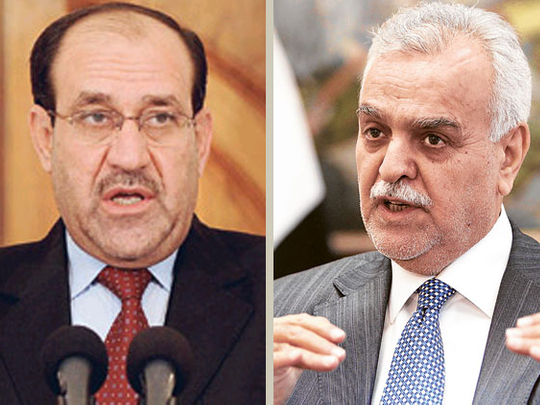
Baghdad: Iraq's fugitive Vice-President, Tarek Al Hashemi, flew to Saudi Arabia on Wednesday as the goodwill generated between Iraq and its Arab neighbours by an extravagant summit in Baghdad last week began unravelling.
The visit by Al Hashemi, who is wanted by authorities on charges of terrorism, came as Iraqi officials announced they had called off a national reconciliation conference planned for Thursday that was supposed to ease tensions between Prime Minister Nouri Al Maliki and the Sunni and Kurdish factions in his coalition government.
Parliament speaker Osama Al Nujaifi told reporters that the meeting had been postponed indefinitely because of "mounting differences" on a range of issues, just one of which is the arrest warrant that the government has issued for Al Hashemi.
Al Hashemi's visit to Saudi Arabia and the cancellation of the conference highlighted the danger that the increasingly intractable political crisis in Iraq will draw in the country's neighbours at a time of increasing polarisation in the region over how to address the unrest in Syria.
Al Maliki had agreed to hold the reconciliation conference as a last-minute concession to his coalition partners ahead of the Baghdad summit, which the government hoped would showcase Iraq as stable, safe and assuming its rightful place in the firmament of Arab nations after the withdrawal of US troops late last year.
Standing by Al Assad
But relations with Arab states have since been deteriorating fast, along with any hopes that Iraq will soon be able to resolve its own internal problems. Al Maliki recently issued a forceful defence of Syrian President Bashar Al Assad, saying his ouster would destabilise the region.
On the same day, Saudi Arabia endorsed a plan to fund and equip Syrian rebels at a US-backed gathering of ‘Friends of Syria' in Istanbul.
Al Maliki's comments triggered blistering attacks in Saudi newspapers. In an editorial in the Saudi-owned Al Sharq Al Awsat, editor Tarek Al Humaid called for sanctions on Al Maliki "to prevent the emergence of a new Saddam or another Bashar".
"What Al Maliki is doing is a sign that the current Iraqi government cannot be trusted, under any circumstances," he wrote.
Other Saudi dailies revived long-standing Saudi accusations that Al Maliki is an agent of Iran, Syria's closest ally. "Is Maliki a voice for Iran or the ruler of Iraq?" asked the daily Al Riyadh.
Al Hashimi flew from northern Iraq's Kurdish region, where he had taken refuge, to Qatar, which is a staunch supporter of the Syrian uprising and which sent only a junior representative to the Baghdad summit.
Sweeping statements
Kamal Al Saedi, a senior official with Al Maliki's Dawa party, told Iraq's Al Sharqiya TV channel that by hosting Al Hashimi, "Qatar and Saudi Arabia are undermining the Iraqi courts."
He added: "Receiving a criminal is not good for diplomatic relations."
The charges against Al Hashimi are only one of a number of issues that have divided Iraq's political factions since US forces withdrew in December. Disputes over oil production, exports and contracts have also put Iraq's Kurds at odds with Al Maliki's government.
Underpinning all the differences are Sunni and Kurdish concerns that Al Maliki is accumulating power for himself at their expense and in defiance of a power-sharing agreement reached in the Kurdish capital, Arbil, before the formation of the government in 2010.
The Sunnis and the Kurds want Al Maliki to recommit to upholding the Arbil agreement, but his State of Law alliance appears unwilling even to promise to put it on the agenda of the postponed reconciliation conference.
Nujaifi, in announcing that the meeting would be delayed, indicated that relations are so tense that any gathering of leaders could be counterproductive. "It is better to postpone the conference until we reach a way out of the stand-off."
— Washington Post












